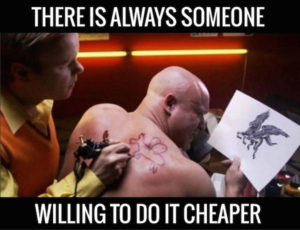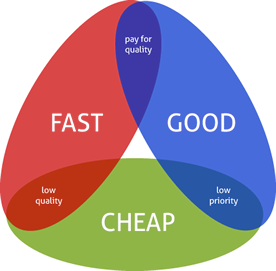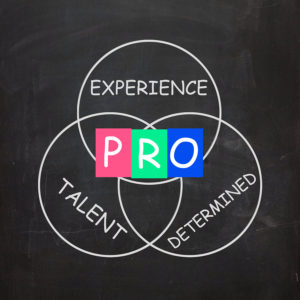
You Get What You Pay For
We’re all familiar with the phrase “you get what you pay for.” It seems we have heard it our entire lives. No one seems to be able to pinpoint the exact origin of the expression. What I do recall is my parents referring to “cheap” products as “made in Japan”. That was because at one time products made in Japan fell apart in just a few days. What a different world it is today. Japanese products (and technology) are some of the most prized and expensive in the world.
Spending too little money on something generally meant that 9 times out of 10 the buyer is guaranteed to be disappointed. It was very rare that a product or service ever lived up to expectations. Price shopping was also a term used “in the day” because it was buyer beware. Look at the most expensive, the least expensive and then settle for somewhere in between.
The level of investment (commitment) mirrors the quality of the results received.
Getting a Deal
 Products and services are always being offered at rock bottom prices. Popular websites such as Elance, oDesk, Guru and Fiver are where one can purchase anything from simple data entry to writing services, website development, and even software coding. Of course, if you are looking for a commodity service, this is the place to go. Read reviews because they are always mixed.
Products and services are always being offered at rock bottom prices. Popular websites such as Elance, oDesk, Guru and Fiver are where one can purchase anything from simple data entry to writing services, website development, and even software coding. Of course, if you are looking for a commodity service, this is the place to go. Read reviews because they are always mixed.
Personally, I’m skeptical of agreeing to services when they are just too cheap to be believed, discounted or too far below market prices. This is when the price doesn’t reflect or equate with expectations and the “get what you pay for” scenario comes into play. Trust me, the lowest price is often a “loss leader”. Yes, some vendors will accept low prices, however, the delivery and service level will likely be compromised. Low-cost service is always going to receive less attention than full paying customers. It’s just the nature of the beast.
“In this world, you get what you pay for.” ~― Kurt Vonnegut, Author Cat’s Cradle
The Cheaper Way is Not Always The Best Way – You Get What You Pay For
 Every day we see ‘freeware’ online. The scaled down version with limited features is usually free. If you want the version that produces the REAL results, you can only get that with an upgraded service. The greatest disadvantages are always extremely limited or no support service and training self-service – open source software is a good example. Free will always have some form of a price attached to it. That is usually i “Plan B” risk mitigation plan, hiring experienced, high caliber talent or simply biting the bullet in the first place to save grief, long-term costs, and disappointment.
Every day we see ‘freeware’ online. The scaled down version with limited features is usually free. If you want the version that produces the REAL results, you can only get that with an upgraded service. The greatest disadvantages are always extremely limited or no support service and training self-service – open source software is a good example. Free will always have some form of a price attached to it. That is usually i “Plan B” risk mitigation plan, hiring experienced, high caliber talent or simply biting the bullet in the first place to save grief, long-term costs, and disappointment.
Everyone is always welcome to work with a free and/or volunteer solution – depending on what service they choose. Most companies are hoping that their customer will be willing to overlook or disregard “what could be” and give up their high expectations. Despite appearances, cheaper is not always necessarily the best route. The bottom line is, if a service has a lower monetary cost, it doesn’t guarantee it is “less expensive”. Time does have a value.In other words, the trouble free version is really the answer if you are interested in saving your valuable time (time = $$$), reducing workload (who has time to backfill a cheap priced service) and a domain specialist (experienced in knowing where to find the ‘
Time does have value in our modern business world. A trouble free option may really be the best bet when you are interested in saving your valuable time (time = $$$), reducing workload (who has time to backfill a cheaper priced service) and offer a domain specialist (experienced in knowing how to avoid the “oops”). Most of the time, a good business decision (commitment) is the best long-term results choice to make. So ask yourself, is there any real “savings” with choosing the lower priced? You get what you pay for.
Free and volunteer work is always “too good to be true”. Why is it that some people are genuinely surprised that “less is less” and never more. Why object to a great service experience for a modest fee when the alternative is only less expensive in the short term? You get what you pay for.
“If you think it’s expensive to hire a professional to do the job, wait until you hire an amateur.” ~Red Adair, Highly Specialized American Oil Well Firefighter
 Pay Peanuts – Get What You Pay For
Pay Peanuts – Get What You Pay For
At one time I worked for a CEO who used to say “If you pay peanuts, you get monkeys.” At the time I could only guess what he meant however as the years went by, I totally got it. You get what you pay for. My people were a reflection on me and I could sink or swim with them.
The true origin of this saying is not clear as so many claim to own it (Sir James Goldsmith being one). Most people believe it was originally American slang. The truth is the phrases appears to be from the mid to late 1800s England.
Simply deciphered the expression means – if you pay a small amount (“peanuts”), don’t expect to get very good workers or services (“monkeys”). Yes, using the word “Peanuts” has long been in American slang, meaning “a small amount.” “Monkey” has had several slang meanings, but the most common one refers to “nonsense.”
Good Will Hunting
There is a classic quote from ““The Common Law of Business Balance” that refers to the recklessness of choosing price as the best way to make a business decision. The 19th century English poet, John Ruskin, a fervent art critic, and socialist, is credited with writing the following reflection on the common law price-
“It’s unwise to pay too much, but it’s worse to pay too little. When you pay too much, you lose a little money – that’s all. When you pay too little, you sometimes lose everything, because the thing you bought was incapable of doing the thing it was bought to do. The common law of business balance prohibits paying a little and getting a lot
– It can’t be done. If you deal with the lowest bidder, it is well to add something for the risk you run, and if you do that you will have enough to pay for something better.”
The common law also goes on to suggest that when dealing with the lowest bidder, a contingency should be added to the risk taken with a low price. It maintains that if someone actually has the funds for a contingency, then they also had enough money in the first place to pay for something better.
“Price is what you pay. Value is what you get.” – Warren Buffett
Get What You Pay For – Today’s Talent Driven Market
When a market is as active as it is today and high demand talent is limited, luring great candidates away from good jobs is extremely hard work. It takes a lot of time, trust, respect and credibility to successfully connect with the true talent. Take note – in these times never misjudge the situation. Talent is not a commodity. On the same hand, neither is the truly seasoned, business focused and experienced search consultant expected to bring them to the table.
Yes, there is always that so-called silver bullet called Social Media. Yes, there will always be so-called “recruiters” who claim to do the job for a lesser fee. Yes, there still are people in a business that view recruitment as a commodity service. And yes, there is no entry exam, license or experience required so “anybody can do this” profession because there, unfortunately, there is no minimum entry level or prequalification. A bartender, cashier or anyone else (not from the business community) one week can be a recruiter the next. And the apprentice will offer recruitment services for whatever a client is willing to pay. You get what you pay for.
 When a profession Making the step beyond general recruitment has long been referred to as a Head Hunter or Search Consultant. A background in business enables this level of the recruiter to actually be able to carry on a business conversation and understand business needs. This professional works at a deeper level and understands the difference between “bums in seats” and adding value to the long-term goals of the business. Business minded Search Consultants do not run a low margin business. They do not work for free in a race to the finish line to collect the final prize. A Euler diagram, based on standard German pronunciation of ”
When a profession Making the step beyond general recruitment has long been referred to as a Head Hunter or Search Consultant. A background in business enables this level of the recruiter to actually be able to carry on a business conversation and understand business needs. This professional works at a deeper level and understands the difference between “bums in seats” and adding value to the long-term goals of the business. Business minded Search Consultants do not run a low margin business. They do not work for free in a race to the finish line to collect the final prize. A Euler diagram, based on standard German pronunciation of ”
Business minded Search Consultants do not run a low margin business. They do not work for free in a race to the finish line to collect the final prize. A Euler diagram, based on standard German pronunciation of “eu”, is a diagrammatic means of representing this scenario that matches specific “sets” and their relationships. You get what you pay for.
Professional business minded Search Consultants who produce high-quality results do not run a low margin business. They do not take on more work than they can do justice. They do not work for free in a race to the finish line where only one person will collect a 1st prize. Chances are pretty darn good that the candidate you meet wasn’t publicly posting their resume on Monster or any other online resume service.
You Get What You Pay For – Look for These Signs
There are several signs that indicate “you get what you pay for” when working with a recruiter or recruiting firm. There are also questions to ask.
- Do you get the impression that this individual is interested in your business and not just taking a job order?
- How many searches is the recruiter working on at the same time or are they willing to make a commitment to your business?
- Does the recruiter have no hesitation to being one of many recruiters with a 25% chance of success?
- Has the recruiter any experience dealing with hiring managers? Would you be comfortable having them speak directly with your Executive Team?
- Can the recruiter “talk shop” with you?
- Will the recruiter represent your company in an honest, fair and professional manner, explaining the merits of your business?
- Is the recruiter capable of performing as your Public Relations representative should they encounter any negative commentary about your company on Glassdoor or elsewhere?
- Is the recruiter very task-oriented – willing to work on anything – or does the recruiter employ a strategic approach?
- Is the recruiter willing to take your job order based on a job description or are they willing to invest time to understand your expectations?
- Can this recruiter give you competitive and market surveillance without violating client confidentiality?
- Is the recruiter actually conducting face to face interviews with candidates before submitting them for an interview?
- Will the recruiter prepare a short list for you or do you have to do all the reviewing of multiple resumes so they can determine what “sticks to the wall”?
- Does the recruiter provide you with compelling reasons for you to invest time doing an interview?
- Does the service level agreement include unbiased, appropriate and documented reference checks?
When a recruiter’s service misses too many any of the above 14 considerations, your business should be questioning how this person is going to meet your staffing needs.
The recruiter who is interested in a quick, down and dirty placement is a recruiter who is not interested in investing in a long term committed relationship with your business. Speed recruiting and speed dating has much in common – a low level of success. If recruitment is not treated as a full cycle, it’s not full service. If it isn’t full service, why are you paying any kind of a fee? You get what you pay for.
Service Level Will Make a Difference in Outcome
 When engaging with the vast majority of service providers (legal, medical, financial, designers, architects, etc., etc.), it is not customary to ask the provider to reduce their fees for the time they will be investing in providing a quality service. It is also unacceptable to ask the provider to volunteer their services as one of 2-10 other firms who are all hoping for the same outcome – the possibility of an invoice at a date in the future.
When engaging with the vast majority of service providers (legal, medical, financial, designers, architects, etc., etc.), it is not customary to ask the provider to reduce their fees for the time they will be investing in providing a quality service. It is also unacceptable to ask the provider to volunteer their services as one of 2-10 other firms who are all hoping for the same outcome – the possibility of an invoice at a date in the future.
In other words, the vast majority of professionals do not work for free. The response to “there are a number of other service providers that are willing to do it for much less”, generally means that is where to take the business high-quality work is not the priority. Commodity services are likely the most appropriate choice.
Competitive contingency search companies share the same business model. Get in and out as quickly as possible with an invoice. As Benjamin Franklin said “Time is Money”. Many of these companies have multiple price structures. Their clients are ranked (A, B, C job orders) based on fee and competitiveness of each search. Which price bucket are you willing to put yourself in?
To be fair, one needs to recognize that the contingency recruiting firms must use a specific business model that works in their industry or they will cease to exist. They must prioritize the amount of time and effort spent on a daily basis. The first in, first out rule applies to all searches. The newest and freshest orders tend to come first and will get the most “live” attention (UNLESS the fee is lower than other searches.) Because the majority of these searches are competitive, claiming the recruiting prize (invoice) before the others are the only way to make any money. Fast = Income. Investing too much time = losing to the competition.
The recruiter who built a business competing on price must also have to run a business built on volume. When running this kind of a low margin business, there is no choice but to focus on multiple searches with quick turnaround. Unfortunately, high quality is not a profitable priority of a commodity led business model. On occasion exceptions to the usual and customary fee for service may be negotiated. This is when a provider may have work done by an articling student, intern or another form of an apprentice rather than on the more experienced recruiter.
The employer gets what they pay for in terms of the recruiter’s time, attention and contribution.
Know Your Limitations, Maximize Your Value
Depending on the role for which a search is required, many companies may have adequate and responsive in-house resources to address their hiring needs. When it comes to “hard to find, needles in haystacks” or senior level talent, most companies agree to invest in the appropriate business skills for the search. A hire considered to be important, valuable and respected requires market insight, position definition, public relations, etc.; all of the time-consuming expertise not readily available to just anyone. Remember, when the going gets tough, competitive and contingency recruiters can easily walk away without ever worrying about solving the problem by finding the best candidate for the job.
For contingency and retained searches, fees are based on a percentage of the candidate’s first year’s compensation. That typically ranges, respectively, from 20 percent to 35 percent. In the US, we are seeing that change. It’s increasing as the smaller working population creates scarcity in many professions.
In Summary – You Get What You Pay For
- Recruiters present their best candidates to employers who are willing to pay for quality and professionalism.
- When top-notch candidates are found, a recruiter will call his most loyal clients first.
- Head hunting is hard work. Finding and convincing quality candidates is tough. It takes time, experience, credibility and attention.
- Recruiters that work for discounted fees = discounted candidates.
- You Get What You Pay For
